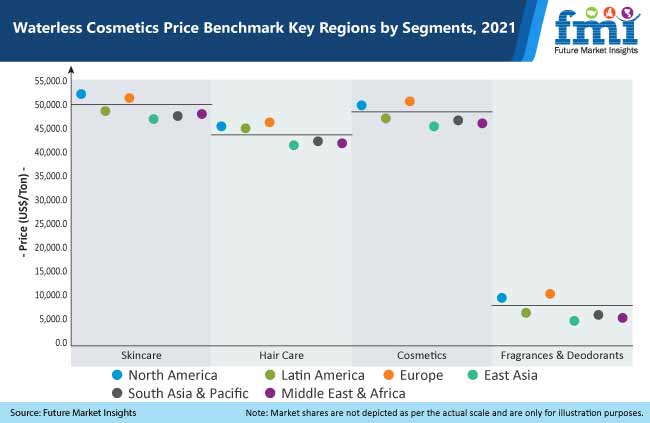Global waterless cosmetics sales is expected to grow at a healthy CAGR of over 13.3% during the study forecast period 2021-2031, according to the latest study by ESOMAR-certified market research firm, Future Market Insights (FMI). The research study tracks waterless cosmetics sales in 20+ countries, offering a lucid analysis of how the growth trend will unfold.
The focus on sustainability is increasing in the cosmetics industry with more consumers opting to purchase less disposable products and wanting companies to make their products more sustainable. Changing consumer behavior has been compelling beauty companies to focus on waterless beauty, upcycling, carbon neutrality, and reusable or refillable packaging.
From the packaging used to better-for-the-environment products, the cosmetics industry is moving towards greener, more natural alternatives. The waterless formulation will continue to be a realistic option, for the companies in order to promote environmental protection. Unilever, L’Oréal, and Procter & Gamble, for example, have committed to reducing their water footprint in the coming years to varying degrees. When major brands commit to more sustainable practices, customers are drawn in.
- To Get a Sample Copy of the Report visit @ https://www.futuremarketinsights.com/reports/sample/rep-gb-12748
In terms of product type, skincare products account for over 37% of sales in the market. The category covers a range of waterless products which include creams, lotions, serums, cleansers, and others. The increasing importance of natural and organic cosmetics is expected to drive the sales of waterless cosmetics in the coming years.

Key Takeaways from the Waterless Cosmetics Market Study
- Rising demand for sustainable beauty products will enable the waterless cosmetics market to reach a valuation of US$ 8.9 Bn by 2021
- Besides high awareness, willingness to spend on sustainable beauty formula will drive waterless cosmetics sales in the U.S., which is expected to account for nearly 80% of the North American market
- Increasing demand for organic skincare will enable the U.K. market to exhibit 5.3% y-o-y growth in 2021 following a period of lull in 2020
- The demand for cruelty-free, vegan, and organic cosmetics will drive sales of waterless cosmetics in India
- Expansion of the beauty sector in Japan and South Korea will drive sales in East Asia
Request a Complete TOC of this Report with figures:
https://www.futuremarketinsights.com/toc/rep-gb-12748
Impact of COVID-19 on the Market:
Before the COVID-19 pandemic, there was a moderate rate of growth in the demand for waterless cosmetics globally. After the pandemic, major global markets have faced dual impacts. Since store-based retailing is a major distribution channel in the beauty industry, store closures in various regions had a significant effect on the growth of beauty products, including waterless cosmetics.
The demand for eco-friendly skincare products has increased in the aftermath of the pandemic, with stay-at-home orders and safer-at-home advisories issued across the world. Additionally, shortage of workers in the sector, less consumption, high cost of production, and shortage of raw materials among other factors have been hampering the waterless cosmetics market.
Who is Winning?
Some of the key players present in the waterless cosmetics market are Unilever Plc., The Waterless Beauty Company, L’Oreal SA, Kao Corporation, The Procter & Gamble Company, Loli, Clensta, Ruby’s Organics, Taiki USA, Ktein, Niconi, True Botanicals, Allies Group Pte. Ltd., Laredo Cosmetics, May Coop, No Cosmetics, Azafran Innovacio006E, and Carter + Jane, among others. Players in the industry have begun to offer discounts on cosmetic brands in order to entice end users to embrace the most up-to-date waterless cosmetics.
Get Valuable Insights into Waterless Cosmetics Market
Future Market Insights, in its new offering, provides an unbiased analysis of the global waterless cosmetics market, presenting historical demand data (2016-2020) and forecast statistics for the period from 2021-2031. The study divulges compelling insights on the waterless cosmetics market based on the product type (skin care, hair care, cosmetic & fragrances & deodorants), price range (economy, mid-range, premium), consumer orientation (men, women, unisex), and sales channel (wholesalers/ distributors, hypermarkets/ supermarkets, convenience stores, specialty stores, departmental stores, online retail, and others), across seven major regions.
Competitive Landscape
The players in the market are currently focusing on enhancing their portfolios to include a wider range of anhydrous beauty products or cosmetics. The manufacturers and brands across different regions are currently stressing more on promotional activities. They are actively collaborating with beauty bloggers and influencers to promote brand awareness. Besides this, the players are also focusing on enhancing their digital penetration to facilitate a wider market reach. Through online penetration many regional and local players have also forayed into a direct-to-consumer sales channels. Companies operating in the market also are focusing on product launches.
For instance, the VAPOUR BEAUTY reformulated their entire product line by offering new brand Pinch of Colour which was launched with entirely waterless formulas.
Some of the leading companies operating in the market are:
- Unilever Plc
- The Waterless Beauty Company
- L’Oreal SA
- Kao Corporation
- The Procter & Gamble Company
- Loli
- Clensta
- Ruby’s Organics
- Carter + Jane
- Taiki USA
- Ktein
- Niconi
- True Botanicals
- Allies Group Pte. Ltd.
- Lavedo Cosmetics
- No Cosmetics
- May Coop
- Azafran Innovacion